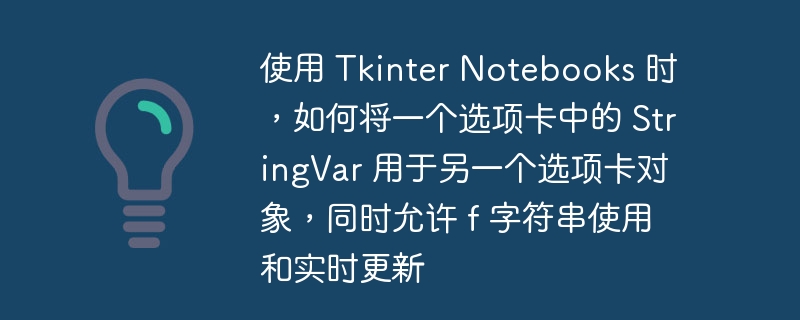
我正在创建一个小项目来帮助创建 bg3 mods。我的最终目标是拥有多个选项卡,我可以在其中输入数据,并在我保存时导出文件。
我能够毫无问题地执行保存和选项卡创建。我想要发生的是在 configtab 中输入 mod 将创建的自定义类的名称(如果有帮助的话,这是用于 dnd 的)。然后在 localizationtab 中我希望有一个带有输入字段的标签。标签将从 configtab 中读取类名称并显示为类名称描述:;所以在配置中我会输入 warrior,在本地化中它将显示 warrior 描述:
我可以调用 stringvar 进行实时更新,但这不允许我使用 f 字符串或其他串联功能。如果我使用 get() 方法,我只会收到在创建窗口时设置为类名的值。因此,如果我使用 classname.set("warrior"),classname.get() 将返回一个字符串,我可以使用 f-string,并且可以让它显示 warrior description。但是,get() 是一次性调用,如果我更改配置选项卡中的数据,则不会更新。
下面是一个准系统的实现,展示了我目前的总体思路。最终项目中将引用多个字段,而不仅仅是类名字段。
mainprogram.py
import tkinter as tk
import tkinter.ttk as ttk
from classconfigtab import classconfigtab
from localizationtab import localizationtab
# create tkinter window
root = tk.tk()
root.title("bg3 mod creation tool")
root.geometry("650x150")
# create notebook
nb = ttk.notebook(root)
config_tab = classconfigtab(nb)
localization_tab = localizationtab(config_tab, nb)
nb.add(config_tab, text='configure class')
nb.add(localization_tab, text='localization')
# load window
nb.pack(expand=1, fill="both")
root.mainloop()classconfigtab.py
import tkinter as tk
from tkinter import ttk
class classconfigtab(ttk.frame):
"""content for the required tab for creating a class mod."""
def __init__(self, *args, **kwargs):
super().__init__(*args, **kwargs)
self.classname = tk.stringvar(name="classname")
self.classname.set("warrior")
self.place_widgets()
def place_widgets(self):
entry_classname = ttk.entry(self, width=50, textvariable=self.classname)
# place widgets
entry_classname.grid(column=0,
row=1,
padx=10,
pady=0,
sticky=tk.w)localizationtab.py
import tkinter as tk
from tkinter import ttk
class LocalizationTab(ttk.Frame):
"""This will contain what is going to be shown on the localization tab."""
def __init__(self, config_tab, *args, **kwargs):
super().__init__(*args, **kwargs)
# This updates automatically but can't use f-string.
self.label_main_name = ttk.Label(self,
textvariable=config_tab.classname)
# This loads the StringVar value on window creation, but does not auto update.
self.label_main_name_two = ttk.Label(self,
text=config_tab.classname.get())
self.place_widgets()
def place_widgets(self):
self.label_main_name.grid(column=0,
row=0,
padx=10,
pady=5,
sticky=tk.W)
self.label_main_name_two.grid(column=1,
row=0,
padx=10,
pady=5,
sticky=tk.W)我在 stackoverflow 中进行了搜索,发现了其他类似的问题。他们引用了使用的跟踪、绑定事件,甚至只是按下一个按钮来刷新数据。
我尝试过跟踪和绑定,但没有成功。也许我实现它的方式不正确,我很抱歉,但我的文件中没有代码来显示我的尝试。
正如您所说,您可以在 tkinter 变量上使用 trace() :
class LocalizationTab(ttk.Frame):
"""This will contain what is going to be shown on the localization tab."""
def __init__(self, config_tab, *args, **kwargs):
super().__init__(*args, **kwargs)
self.config_tab = config_tab # save for later access
self.label_main_name = ttk.Label(self)
# call self.update_label() whenever the variable is updated
config_tab.classname.trace_add("write", self.update_label)
self.place_widgets()
self.update_label() # update label initially
def place_widgets(self):
self.label_main_name.grid(column=0,
row=0,
padx=10,
pady=5,
sticky=tk.W)
def update_label(self, *args):
self.label_main_name["text"] = f"{self.config_tab.classname.get()} Description:"
以上是使用 Tkinter Notebooks 时,如何将一个选项卡中的 StringVar 用于另一个选项卡对象,同时允许 f 字符串使用和实时更新的详细内容。更多信息请关注PHP中文网其他相关文章!




